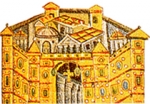21 July 2006
"Moderate" Islam in Egypt - But not for Converts to the Christian Faith
 A wave of arrests for apostasy in Egypt. The story of a young baptized, forced to keep his new faith hidden. The fluctuating position of the Church
A wave of arrests for apostasy in Egypt. The story of a young baptized, forced to keep his new faith hidden. The fluctuating position of the Church
ROMA - Broken by the very well-informed agency "AsiaNews" of the Pontifical Institute for Foreign Missions, the news of the arrest in Egypt of citizens guilty only of being ex-Muslim Christians sheds new light on the dangers encountered by those who convert from Islam to another faith.
The dangers are there even in the West, for Muslims who convert. These protect their decision with a thousand precautions. And the Church does the same toward those who convert to the Christian faith. About their preparation for baptism, the Italian bishops¿ conference published in 2000 a booklet of instructions. The first: "From the initial greeting, it is important to guarantee discretion." Even the total number of baptisms is kept secret. It is known that, in Italy, approximately one half of the converts are Albanian: and these face the least danger, because in Albania Islam is almost exclusively a nominal religion, with very little social command. But for the Maghrebs, or the Syrians, or the Pakistanis, the risk is serious. Both the Muslim community at home and their own family ban them like apostates. It can happen that their very lives hang by a thread.
Muslim Kurds are another island of relative tolerance toward the converts. Daniel Ali embraced Christianity while he was still living in northern Iraq and fighting against Saddam Hussein. He emigrated to the United States in 1993, was baptized in 1995, and in 1998 entered the Catholic Church. Working together with the Jesuit expert in Arabic studies Mitch Pacwa, he has created a "Christian-Islamic Forum" and travels around the U.S. to preach Christianity to other Muslims.
But a clandestine life is the rule almost everywhere in the world. And on the part of the Catholic Church, there is a widespread tendency to respond to this situation simply by refusing to "create the problem"; that is, to proselytize among Muslims. An Italian director of the Fondazione Migrantes, who asked to remain anonymous, has worked for years with Tunisian Muslims and says: "We decided not to encourage conversion to Christianity in any way, no matter what cardinal Giacomo Biffi thinks about it." The bellicose cardinal has exactly the opposite conviction: "Preaching and baptizing are statutory duties of the Church. For all. Jesus did not command us to preach the gospel to all creatures except for the Muslims, the Jews, and the Dalai Lama."
The tendency to conduct dialogue without evangelizing has its own negative repercussions on those who become Christian nonetheless. The complaint of a Maghreb woman named Nura made its way last September all the way to the Vatican: "We feel abandoned. After our conversion, we have no one to support us. We ask the Church for help: protect us, defend us." Archbishop Michael Fitzgerald, president of the Pontifical Council for Interreligious Dialogue, responded to her with a bunch of hot air - even worse, with mistrust. "One must always ask for the reasons for this change. It often presents itself as the desire to be a real Italian. But on can be Italian and Muslim at the same time. I would be concerned from the beginning, in the sense of the welcome within the Christian community."
A few days later, on September 28, John Paul II published the list of the new cardinals. Fitzgerald, who was thought would surely get the red hat, was not there. A few weeks later, Joseph Cardinal Ratzinger added in an interview, "we must have the courage to help these people," and get rid of a certain "Christian conscience that is unsure of itself." The authoritative periodical "La Civiltà Cattolica," an unofficial organ of the Holy See, refreshed the public memory about the living conditions in Islamic countries, with an unprecedentedly tough article. So there¿s been a leap forward. Who knows if Nura will feel any less alone?
But here is a closer look at what has happened in Egypt in recent weeks, with an Islamic regime generally classified as "moderate." This inquiry was published in "L¿espresso" no. 50, for December 5-11, 2003.
05:03 Posted in Egypt | Permalink | Comments (0) | ![]() Facebook |
Facebook |



















The comments are closed.